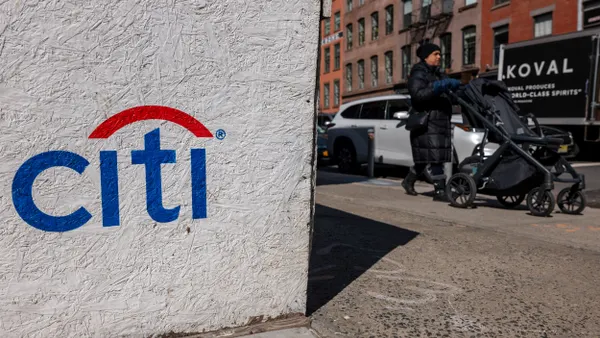Dive Brief:
-
Sixty-four percent of consumers would consider buying or applying for financial products from a tech company instead of traditional banks and credit unions, according to a Harris Poll survey commissioned by the digital card services firm Ondot Systems. Eighty-one percent of American consumers ages 18 to 34 would prefer fintech companies over legacy banks and credit unions.
-
Seventy-two percent of Americans think tech companies such as Amazon, Google, Apple and Facebook entering the financial services sector would pose a significant threat to smaller banks and credit unions. However, 64% of Americans think technology companies entering the financial industry would encourage traditional financial firms to improve their financial products, the report also indicated.
-
Three-fourths of respondents think technology companies are not transparent about how they use consumers' personal data, and 74% of Americans think tech companies are more likely to sell consumers' personal financial information than traditional banks and credit unions, the survey also found.
Dive Insight:
As banks continue to partner with fintech firms and fintechs buy traditional banks, it's critical for the financial sector to understand consumers’ perceptions of both emerging and legacy firms. It remains up for debate whether traditional banks' branding could help or hurt the success of their fintech partnerships.
Ondot Systems' findings shed light on why consumers are gravitating toward fintech firms over traditional banks and credit unions as well as their hesitancy to give in fully to emerging tech companies.
While the survey largely points to consumers preferring fintech firms, it also found 69% of American consumers think tech companies are more likely to experience a data breach. But small traditional institutions could lose consumers who are willing to overlook their skepticism in favor of value, Vaduvur Bharghavan, CEO of Ondot Systems, told Banking Dive.
"Financial institutions, particularly community banks and credit unions, need to be empowered to offer an Apple-card-like solution, not just payment cards but digital cards," Bharghavan said. "There is a certain notion of trust and personal connection with community institutions. The challenge is you have to make a choice today."
The skepticism toward fintech firms is another sign they need to strengthen their security measures to build public trust. Even the Independent Community Bankers of America (ICBA) called for national data privacy guidelines. Though the survey finds that consumers anticipate smaller institutions to improve their services as tech firms enter the sector, it’s not clear whether small banks and credit unions will survive. Last October, FDIC Chair Jelena McWilliams said small banks won’t survive if they don’t collaborate with larger fintech firms.
Small banks and credit unions don’t have the capability to develop their own technology to compete with fintech firms, and fintech startups need traditional banks — and the customer relationships they’ve built — for distribution channels, Bharghavan said.
"For a variety of reasons, both for the need for communities to have these local financial institutions because of all the jobs and the social aspects therein, we believe that banks and credit unions really need to try, and the biggest impediment for them is how to get the technology delivered easily," Bharghavan said.










